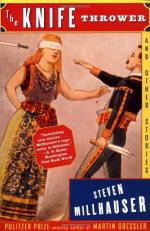|
This section contains 207 words (approx. 1 page at 300 words per page) |

|
Millhauser explores the odd fascination that some societies seem to have about things with which they are not supposed to be fascinated. Guilty pleasures seem to be the best kind for many people. From these "unnatural" pleasures comes a sense of identity, for those participating and for those just watching. Whether priority is placed on independence or community vigilance also seems to be a primary concern for this story.
1. Is the community's fascination with Hensch similar to the popularity of "reality television"? In what ways is it alike or different?
2. Should the audience have stopped the three volunteers from being marked?
Why or why not? Would it have been different if the volunteers had been older? Why or why not?
3. Why would they each want to be marked? What is Hensch's appeal?
4. Do you think that the final act, "the ultimate sacrifice," was staged? Why or...
|
This section contains 207 words (approx. 1 page at 300 words per page) |

|




